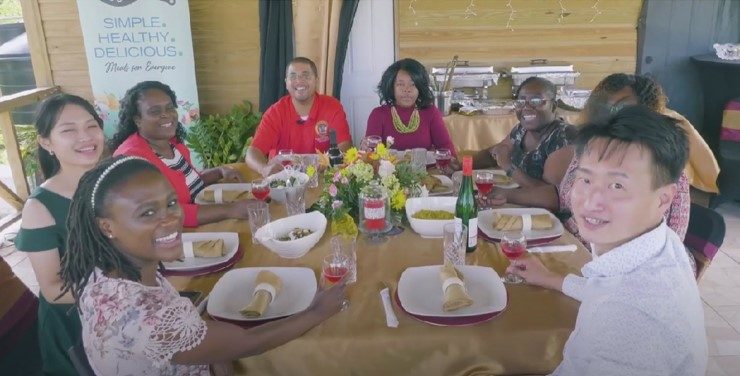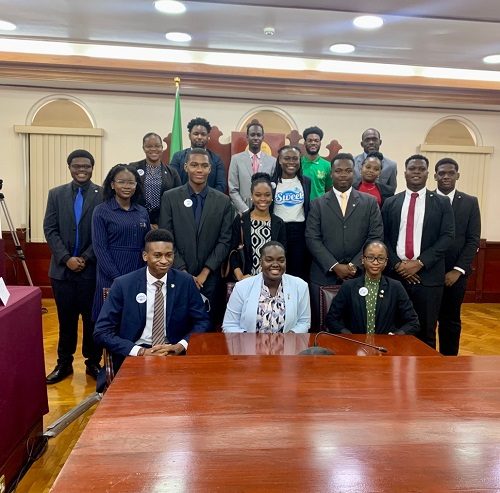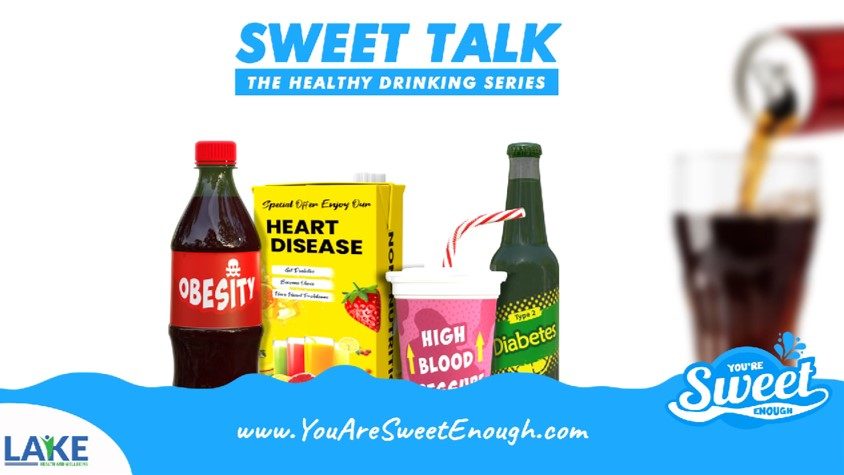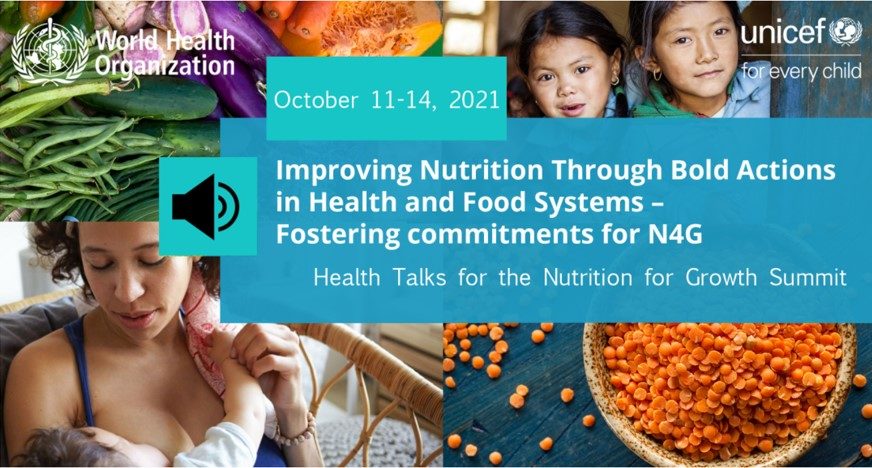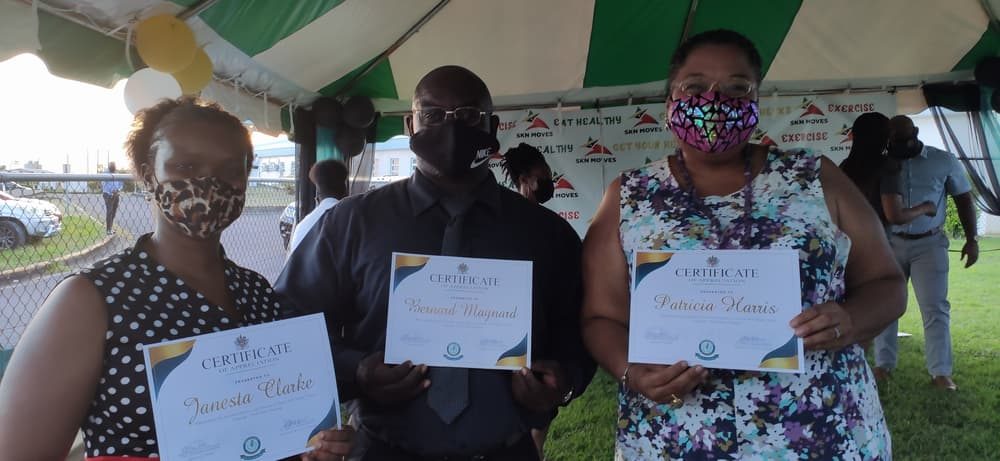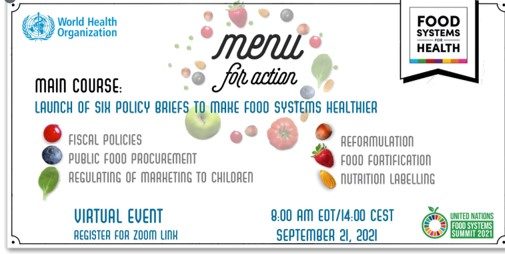Category: Blog
Health Minister announces SSB Policy for 2022
During national budget presentations in the St. Kitts and Nevis National Assembly on December 15, 2021, Hon. Akilah Byron-Nisbett, Minister of Health et al. announced that the implementation of a Sugar-Sweetened Beverage (SSB) Policy is on the agenda for 2022.
In her presentation, the Minister of Health listed a few initiatives that the government intends to undertake as part of plans for the prevention and control of non-communicable diseases (NCDs) in the new fiscal year. Plans include the reactivation of the local NCD Commission, the implementation of the national SSB Policy and a Tobacco Control Act.
The Minister reported that improvements have been made in reducing the incidences and impact of NCDs in the federation. She notes that “epidemiological statistics have revealed that over the period 2015 to 2020…the number of deaths associated with diabetes and high blood pressure are notably trending downwards”. The average mortality data for NCD related deaths is reported to have decreased from 83% to 63% within the stated period.
View and listen to the excerpt clip below broadcasting the Minister of Health’s budget presentation on all plans to combat NCDs as part of the 2022 public health agenda.
Dance Competition Winners
On 4th December 2021, we hosted a virtual event to announce the winners of the You’re Sweet Enough School Dance Competition.
This competition was a collaboration with the Curriculum Development Unit of the Ministry of Education in St. Kitts, and participants had to learn the official You’re Sweet Enough dance, record themselves performing the dance to the You’re Sweet Enough jingle and then upload the recording to the competition’s webpage for a public vote.
We were absolutely delighted with the engagement from schools. We received 28 entries and were so impressed with the creativity, video editing and enthusiasm of all those who entered the competition. Additionally, they were very effective at communicating the message of the jingle of encouraging everyone to reduce their sugar-sweetened beverage consumption and to drink water instead.
The winners of the competition are listed below and you can watch a recording of our short winners’ announcement event below too.

Youth Parliament Debates SSB Policy
On November 29, 2021 as part of the annual mock parliament sitting, the St. Kitts National Youth Parliament Association (SKNYPA) debated a resolution to adopt a national sugar-sweetened beverage policy. The debate took place in parliament chambers and followed formal protocols of government business according to the standing orders of the National Assembly.
The resolution to adopt a national SSB Policy was tabled by the government benches and spoke to the following initiatives:
- Implementing a 30% excise Sugary Beverage Tax (SBT) on all non-alcoholic SSBs;
- Conducting multi-sectoral research studies to assess the impact of the SBT on sales and consumption of SSBs;
- Restricting the sale and advertising of all SSBs at hospitals, health centres and school cafeterias and canteens;
- Creating healthy schools zones by prohibiting the sale of SSBs within a designated radius of school premises;
- Launching public awareness campaigns to sensitize communities, and
- Allocating portions of the earned tax revenue to create, support and develop nutrition and physical activity-related programs.
While members of the opposition commended the objective of the resolution as an effort to combat NCDs and address rising rates of obesity among children and youth, debaters presented arguments for improving the policy, noting that approaches to implementation must be holistic. The opposition spoke to the interests of industry with special considerations for micro-business vendors, who ought to be consulted and engaged in the process of change to provide and sell healthier beverage alternatives.
The debate between sides was lively and concluded with the resolution being passed with a simple majority. To view the debate and hear the arguments presented, check out the video below.
An SSB Tax for SKN
In our latest episode of Sweet Talk, our Advocacy and Research Officer, Isalean Phillip has an interesting and informative discussion with Dr Marissa Carty, the NCD Coordinator at the Ministry of Health in St Kitts, about fiscal policies to tackle non-communicable diseases, specifically an SSB tax.
Improving Nutrition Through Policy
From 11th to 14th October 2021, the Department of Nutrition and Food Safety of WHO and UNICEF hosted a week-long series of webinars that explored strategies for improving nutrition through bold actions in health and food systems.
Three of the webinars in this series aligned perfectly with the work that we’re doing to promote healthy drinking habits through our You’re Sweet Enough campaign, so we were delighted to attend to learn more about global approaches which could be applied to our local context here in St Kitts and Nevis.
The three webinars that we attended were:
- Improving Diets Through Fiscal Policies
- Improving Diets Through Labelling and Marketing Restrictions
- Improving Nutrition in Children and Adolescents Through Comprehensive School-Bassed Policies and Programmes
In the first webinar we attended, Improving Diet Through Fiscal Policies, there was a focus on various fiscal measures to improve the diets of the public and thus improve the health of consumers. These measures included taxation of unhealthy products like sugar-sweetened beverages and subsidising healthy products. Taking us through the various measures were speakers from Mexico, South Africa, Kuwait, Saudi Arabia and Portugal who discussed the steps that their countries are taking particularly around the taxation of unhealthy foods. It was interesting to note that Saudi Arabia has introduced a sugar-sweetened beverage tax of 50% on sodas and 100% on energy drinks in order to tackle their very high rates of obesity and NCDs. These SSB tax rates are the highest SSB tax of the countries represented on the panel and have resulted in a significant reduction in purchases of SSBs showing that bold action with fiscal policies can be effective.
.
The second webinar we attended focused on labelling and marketing restrictions. This webinar featured speakers from Saudi Arabia, Mexico, Thailand, France, the UK and Chile who shared their experiences with front-of-package nutrition labelling (FOPL). Speakers touched on mandatory and voluntary approaches to front-of-package nutrition labelling and the effectiveness of FOPL in empowering consumers to easily assess the nutritional value of the foods they purchase. Additionally, speakers highlighted that the public has the right to know what is in their food and we are, currently, violating their human rights, but simple measures like labelling and restricting marketing of unhealthy foods can address this.
Finally, the third webinar we attended focused on creating a healthy school environment through comprehensive school-based policies and programmes. This was a very interesting session providing us with the opportunity to learn about projects being implemented by Ministries of Health and Education in Ghana, India and the Dominican Republic to improve the health and wellbeing of school children. These projects included measures such as providing nutritious meals in schools, health education, nutrition supplementation and disease prevention. Interesting questions were asked about how to reach children who are not in the school system and how to evaluate the impact of such programmes..
These webinars provided us with some good insight on the power of policy in improving the health of populations. In St Kitts and Nevis, the Government is currently working on developing a Federal SSB policy as part of their NCD Action Plan. This includes a collection of evidence-based approaches to reduce the public’s consumption of SSBs. We applaud the Ministry of Health for pushing forward with this policy and as part of our You’re Sweet Enough campaign we’re calling for:
- A fiscal policy to reduce the consumption of sugar-sweetened beverages (an SSB tax)
- The introduction of front-of-package warning labels so that consumers can easily and quickly identify products that are high in sugar as well as salt and unhealthy fats
- The restriction of the sale and marketing of SSBs in and around schools
Through these actions, the Government can begin to address a major risk factor for NCDs and create a healthier environment.
We look forward to seeing the Government’s SSB policy finalized and encourage Cabinet to approve the Ministry of Health’s policy so that we can improve the health of our nation.
Challenge Winners Announced
From 22nd August to 5th September 2021, we hosted a No Sugar-Sweetened Beverage (SSB), Drink Water Challenge in collaboration with St Kitts and Nevis Ministry of Health. This challenge was part of the Ministry of Health’s seven-week SKN Moves campaign and aimed to provide a fun way to encourage the public to make healthier beverage choices.
Over forty people registered to take part in the challenge and over the two weeks, they tracked their water consumption using a water tracking app and submitted videos and pictures sharing their progress. Additionally, we set up a WhatsApp group to allow participants to encourage each other and to build a small community around the challenge.
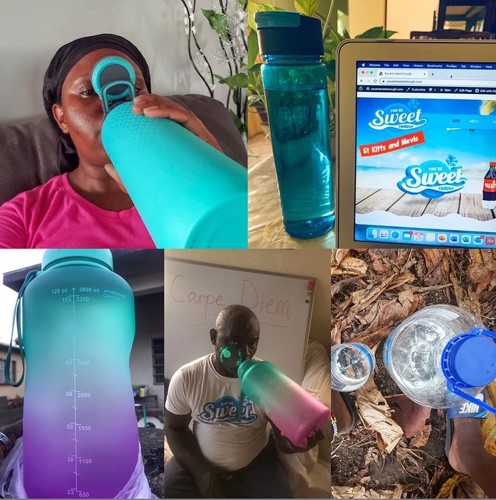
Our group of participants did a great job, remaining committed to the challenge and after reviewing their water tracking app submissions and calculating their water consumption over the two weeks, we selected three winners.
- 1st Place (2103.3oz) Janesta Clarke
- 2nd Place (1988.3oz) Patricia Harris
- 3rd Place (1672.6oz) Bernard Maynard
Awards Ceremony
On Thursday 23rd September, our winners were awarded a certificate and prizes from Hon. Akilah Bryon-Nisbett, the Minister for Health for St Kitts and Nevis, at the first annual SKN Moves Awards Ceremony.
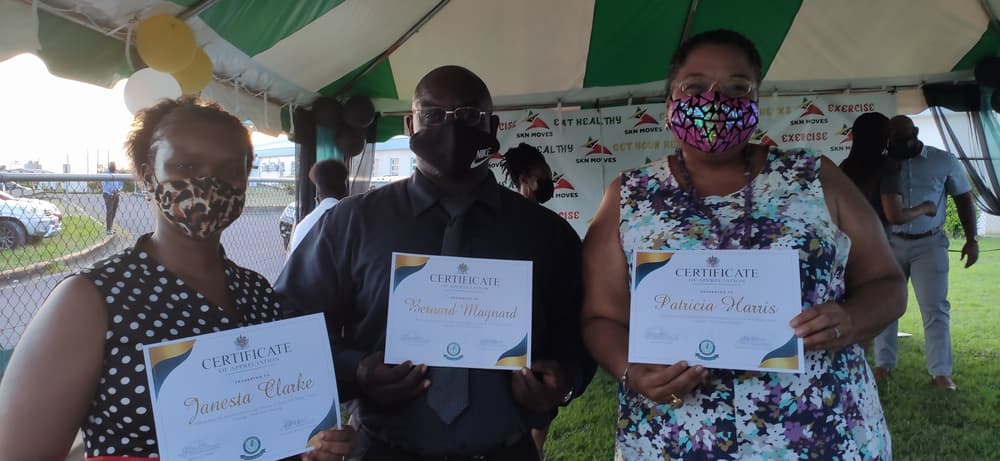
In addition to our prize winners, other people were recognised for participating in other challenges that were organised over the seven-week SKN Moves campaign. These included:
- The In Ya Kitchen Healthy Cooking Competition
- Ready! Set! Sweat! Weight Loss Challenge
- Chronic Disease Self-management Challenge
- Corporate Wellness Challenge
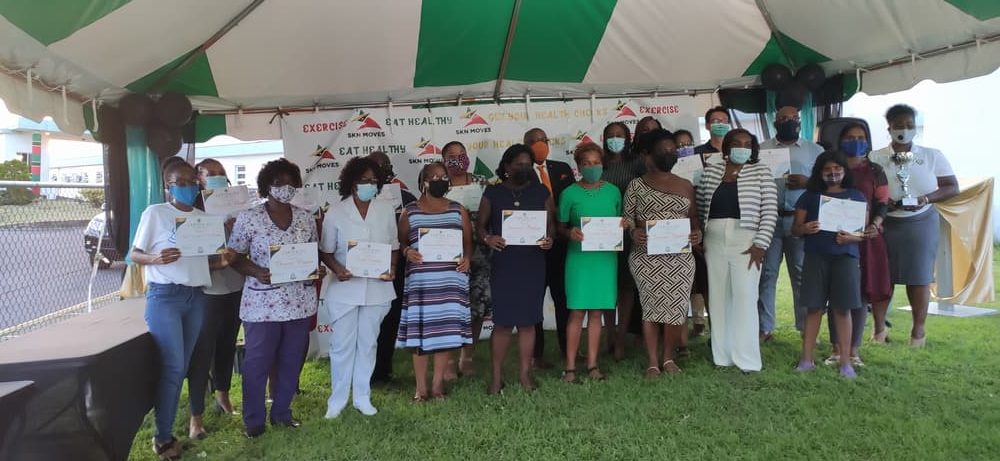
We were delighted to attend this inaugural event to support our winners and also to hear speeches delivered by:
- Dr. The Hon. Timothy Harris, Prime Minister of St Kitts and Nevis
- Hon Akilah Byron-Nisbett, Minister for Health
- Dr Marissa Carty, NCD Coordinator, Ministry of Health
All three speakers highlighted the government’s commitment to tackling NCDs with SKN Moves being just one part of their strategy. Now in its second year, the SKN Moves initiative aims to promote the prevention and control of NCDs through three core pillars: healthy eating, regular exercise and age-appropriate health checks. Furthermore, SKN Moves is part of a wider programme, Caribbean Moves, which aims to tackle the high rate of NCDs in the region through a collective approach. In addition to highlighting the SKN Moves campaign, speakers also discussed the Government’s efforts to tackle the overconsumption of sugar-sweetened beverages through their national SSB policy which is in its final stages of development.
We applaud the Ministry of Health for continuing to push forward with developing this policy which features a collection of evidence-based approaches to reduce the public’s consumption of SSBs. We look forward to seeing this policy finalized and implemented.
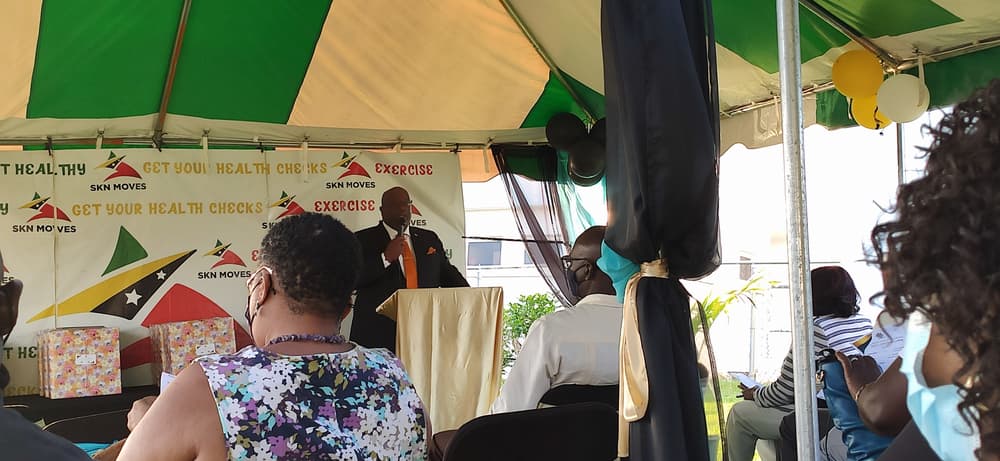
Thank you!
We would like to say a big thank you to everyone who took part in our No SSB, Drink Water challenge and congratulations to all our winners.
We would also like to thank the Ministry of Health’s Health Promotion Unit for inviting us to become a member of this year’s SKN Moves Committee and Open Interactive for sponsoring our orientation session for our challenge participants. We look forward to next year’s campaign.
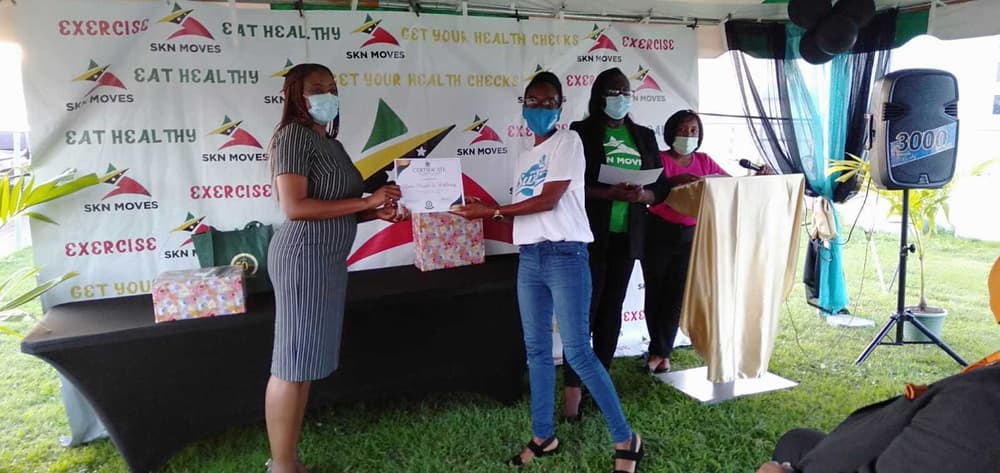
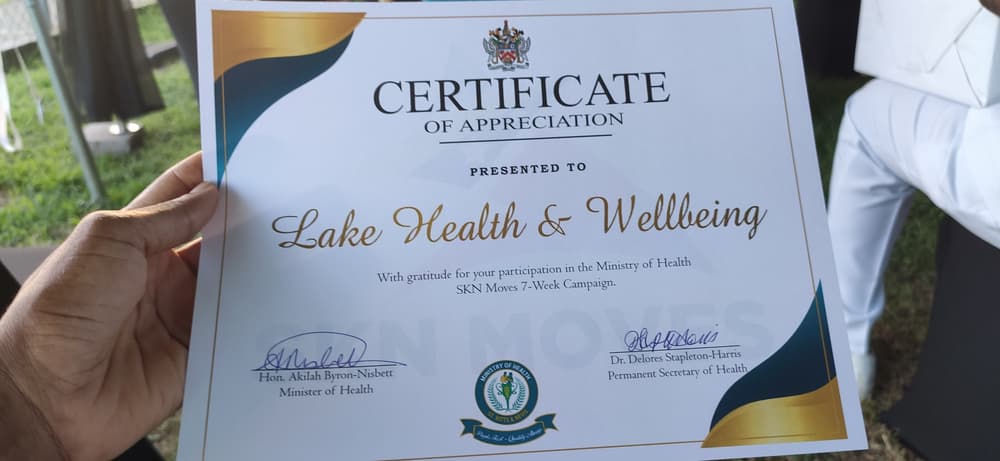
WHO’s Food Policy Recommendations
On 21st September 2021, the World Health Organisation hosted a virtual pre-launch of its six policy briefs on the actions that are required in the global food system to deliver better health and nutrition for everyone.
These briefs are part of WHO’s efforts to empower policymakers to develop effective interventions that improve the health of their nations and to tackle the growing rate of non-communicable diseases (NCDs). It is hoped that these resources, as well as a series of other resources which include guidance documents, implementation frameworks and tools to scale up action will support UN members in meeting global nutrition and NCD targets. Additionally, because of the connection between food systems and many global challenges like poverty, inequality, malnutrition and climate change, it is also hoped that these policy briefs will enable countries to achieve the Sustainable Development Goals by 2030.
During the virtual launch, WHO explained that their six new policy briefs focus on areas that are not new but are nevertheless important because they are known to be effective at promoting health, and the goal is to ensure that food systems are based on health, not profit and productivity.
It was also explained that the policy briefs are based on previous work conducted by WHO and its partners. Specifically, they build on a report on sustainable food systems which highlighted the five ways in which food systems can negatively affect the public’s health. These are depicted below and highlight the need for health to be at the centre of our global food system.
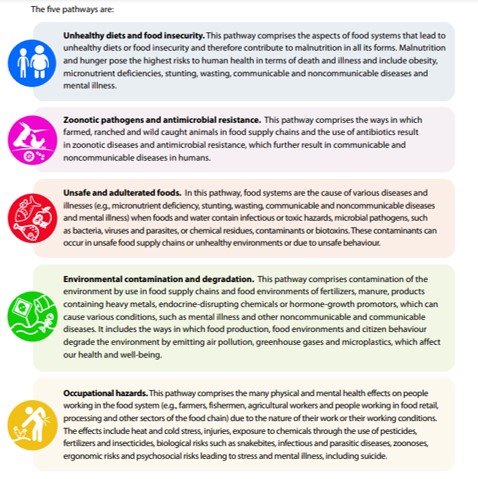
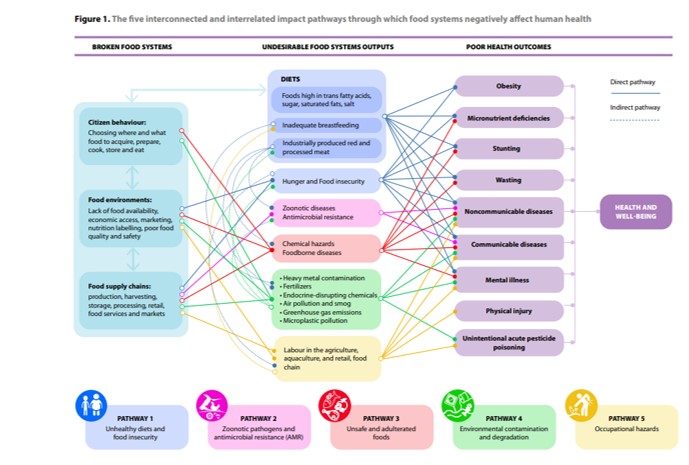
WHO's Policy Briefs
WHO’s new policy briefs cover:
- Public food procurement to facilitate the provision of more nutritious foods in Government settings so that public schools, hospitals and other Government-funded organisations have access to healthy meals
- Fiscal policy to shift the public’s behaviour towards healthy diets. These types of policies include taxes on unhealthy foods and drinks and subsidising healthy options
- Regulation of marketing of unhealthy foods and drinks to children to shift their preferences to healthy foods
- Nutrition labelling so that consumers can easily identify products that are high in sugar, salt and unhealthy fats and allow for informed purchases
- Food fortification to make foods more nutritious
- Food reformulation to reduce the salt, sugar and unhealthy fat content of food and beverages, and to eliminate trans-fat.
As explained in this event, policymakers can be confident in implementing the above-mentioned policies because these are long-standing approaches that have been proven to not only be effective, but cost-effective and scalable. Additionally, they have been endorsed and monitored by WHO.
What Does this Mean for St Kitts and Nevis
As St Kitts and Nevis looks to tackle its high rate of NCDs, the WHO policy briefs provide an evidence-based approach that our policymakers can easily adopt to create a healthy environment. As part of the Ministry of Health’s NCD Action Plan, several of the WHO’s six policy areas are already embedded into their strategy and all that is left is implementation.
Currently, we know that NCDs are the biggest health challenge that St Kitts and Nevis faces so urgent action is needed to reduce the prevalence of NCDs and our high rate of NCD-related death and disability.
We hope with this greenlight from the WHO through these new policy briefs, the Government of St Kitts and Nevis will be more likely to introduce these healthy food policies.
What Are We Doing?
On 17th September 2021, as part of our You’re Sweet Enough campaign, we joined local and regional civil society organisations (CSOs) to write to all members of the St Kitts and Nevis Parliament to call for the introduction of evidence-based food policies to tackle the consumption of sugar-sweetened beverages (SSBs).
Due to the very high level of sugar in SSBs, their regular consumption has been linked to weight gain and obesity, and being overweight or obese increases a person’s risk of developing non-communicable diseases (NCDs) such as type 2 diabetes, heart disease and some types of cancer.
Research has shown that 45% of adults and 26% of children in St Kitts and Nevis are obese, and this is contributing to the high rate of NCDs in the Federation. By reducing SSB consumption, we can reduce a major source of sugar in our diets, and this can lead to a reduction in NCD risk.
Specifically, our letter focused on three policy areas, all of which align with the WHO’s new policy briefs.
- A fiscal policy to reduce the consumption of sugar-sweetened beverages (an SSB tax)
- The introduction of front-of-package warning labels so that consumers can easily and quickly identify products that are high in sugar as well as salt and unhealthy fats
- The restriction of the sale and marketing of SSBs in and around schools
Through these actions, the Government can begin to address a major risk factor for NCDs and create a healthier environment. We look forward to the Government’s response and hope that action will be taken.
Our Panel Discussion on NCDs
On 25th August 2021, as part of our You’re Sweet Enough week, we were delighted to host a panel discussion exploring an all-of-society approach to tackling non-communicable diseases (NCDs) and promoting healthy drinking and eating.
This event was part of a collaboration with the Ministry of Health and formed part of their seven-week SKN Moves campaign. Now in its second year, SKN Moves falls under the Caribbean Moves program which seeks to tackle non-communicable diseases (NCDs) in the region by focusing on healthy eating, physical activity, and age-appropriate health checks.
NCDs in St Kitts and Nevis
NCDs are the major public health challenge in St Kitts and Nevis Specifically, 54% of adults have at least one chronic illness, and before the pandemic, the Nevis Island Administration reported that 85% of hospital admissions were NCD-related (PAHO 2012; Ministry of Health). Additionally, 83% of deaths in St Kitts and Nevis are due to NCDs (Ministry of Health). Furthermore, the prevalence of diabetes in St Kitts and Nevis is three times higher than the world average, and our hypertension prevalence is 9% higher than the global average.
With so many people in St Kitts and Nevis being affected by NCDs, it is important for us to focus on prevention and control strategies and our You’re Sweet Enough campaign has been focusing on one NCD risk factor, sugar-sweetened beverages (SSBs). Our campaign aims to raise awareness of the harmful health effects of consuming sugar-sweetened beverages like sodas, fruit drinks, energy drinks and sports drinks, and to encourage everyone to drink water as the healthy alternative.
Due to the very high level of sugar in SSBs, their regular consumption has been linked to weight gain and obesity, and being overweight or obese increases a person’s risk of developing non-communicable diseases (NCDs) such as type 2 diabetes, heart disease and some types of cancer.
Research has shown that 45% of adults and 26% of children in St Kitts and Nevis are obese, and that this is contributing to the high rate of NCDs in the Federation.
By reducing SSB consumption, we can reduce a major source of sugar in our diets and this can lead to a reduction in NCD risk and related death and disability.
Our Panel Discussion

The panel discussion we hosted on 25th August, aimed to bring together representatives from a variety of sectors to explore how we can all work together to tackle risk factors like SSB consumption. This discussion was moderated by Isalean Phillip, our Advocacy and Research Officer and panelists included:
- Dr Marissa Carty, NCD Coordinator, St Kitts and Nevis Ministry of Health
- Dr Al Pierre, VP of the St Kitts and Nevis Medical and Dental Association
- Andre Huie, Director of SKN Newsline
- Jalanie Belle, a member of the St Kitts National Youth Parliament Association
- Pastor Philip Webbe, a member of the St Kitts Evangelical Association
We had a very informative and insightful discussion on the prevention and control of NCDs. We touched on policies like SSB taxation, making healthy foods more affordable, public education and the marketing of healthy and unhealthy foods, and more. It was great to have youth representation on the panel from the St Kitts National Youth Parliament. They voiced their concern at the high rate of childhood obesity and called for action.
We would like to thank all the panelists for taking part in this discussion and Isalean for so ably moderating this important conversation. You can watch the recording of the event below and please feel free to leave any comments or questions that you may have in the comments section below, we would love to hear from you.
Action Needed To Reduce the Growing Rate of NCDs
St. Kitts and Nevis is facing a non-communicable disease (NCD) epidemic which has now been exacerbated by COVID-19. At the upcoming United Nations’ (UN) Food Systems Summit, taking place in September 2021, the government should strive to create lasting healthy food policies and decrease ultra-processed food production that contributes to growing rates of diet-related NCDs. In a recently published BMJ Global Health article, researchers from around the world urge international bodies to confront the change in modern food processing and call on governments to pass evidence-based healthy food policies.
A small number of transnational corporations are responsible for the enormous volume of ultra-processed foods that are readily available to consumers worldwide. Ultra-processed foods and beverages are formulations of food substances typically containing additives and little or no whole foods. These products are notoriously cheap, yield high profit margins and are ubiquitously marketed globally, with few restrictions. In middle-income countries, including St. Kitts and Nevis, ultra-processed foods make up 15-30% of total energy intake and sales continue to grow.
There is growing evidence that these products are habit-forming or even addictive, which can encourage overconsumption and cravings for these products, further perpetuating the non-communicable diseases (NCDs) they cause. Recent peer-reviewed studies have shown that ultra-processed product consumption can increase the risk of several health conditions, including weight gain, obesity, high blood pressure, type 2 diabetes, and heart disease.

While many countries have already passed healthy food policies to address the NCD epidemic, St. Kitts and Nevis needs to act because our global food systems are failing. Implementing a package of policies including fiscal measures, marketing regulations and mandatory front-of-package warning labels can discourage the production and consumption of ultra-processed foods. At the same time, the government needs to encourage the consumption of fresh or minimally processed foods, ensuring that they are not only available, but also accessible and affordable for all people.
Lake Health and Wellbeing along with other civil society organizations in the federation and across the Caribbean, join public health researchers and call for St. Kitts and Nevis to commit during the UN Food Systems Summit to act on passing healthy food policies that will improve public health – our nation’s health and sustainability depend on it.







